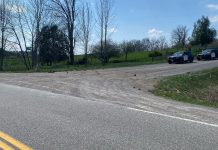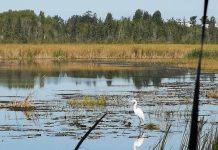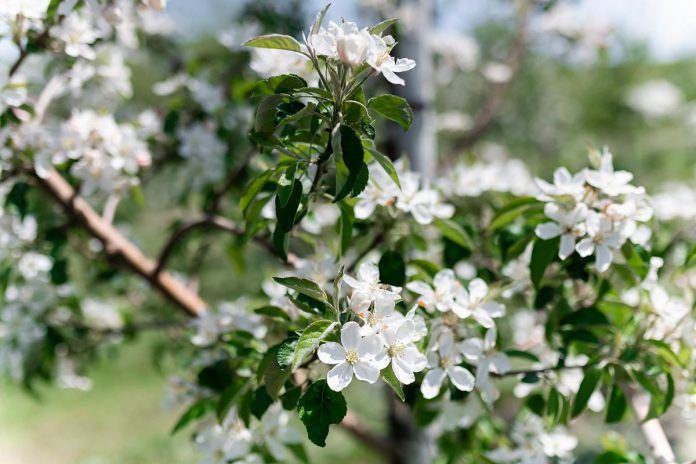
If you were asked to list where apples grow in Ontario, Haliburton County certainly wouldn’t be at the top of the list — or even on your list at all.
That’s a misconception the not-for-profit organization Apple Tree Identification Project Haliburton (ATIP Haliburton) hopes to change, including by hosting two events in May: the second annual self-guided Apple Blossoms Tour and the All About Apple Trees Symposium on Thursday, May 16 and Friday, May 17 at the Haliburton Legion.
ATIP Haliburton is an organization dedicated to nurturing and educating people on Haliburton County’s apple-growing legacy. It all began with one question: Why do apple trees grow in Haliburton County considering the short growing season, harsh conditions, rocky terrain, and its location above the apple-growing region that spread along the north shore of Lake Ontario?
“Ontario used to have thousands of cross-cultivars of apple trees, but ever since we’ve gone for the more industrialized, commercialized growing of our orchards, we’re down to about 40 or 50 that are actually just cultivated in Ontario in general,” says ATIP Haliburton assistant coordinator Carmen Galea.
“Haliburton County (doesn’t include) those 40 to 50, but there are unique varieties here. They’ve been pushed to the wayside in a lot of ways, and we are trying to highlight that they’re still here and they’re still a food resource and there’s still utility in resurrecting them in the community.”
ATIP Haliburton founder Luba Cargill, a Haliburton Highlands real estate agent, was the first to pose these questions and enlisted the help of Minden’s U-Links Centre for Community-Based Research to get students involved in researching. Galea, a recent graduate of Toronto Metropolitan University, was one such student and began mapping out the historical context and a preliminary inventory of all apple trees in Haliburton County.
“There are 100-year-old trees that grow really well here because they’re used to these conditions and they thrive in them and they are still producing apples,” she explains. “So, we’re trying to give this knowledge to the community about cultivated apples that do well in Haliburton County and also the understand of the role they’ve had in the agricultural community in general in the area.”
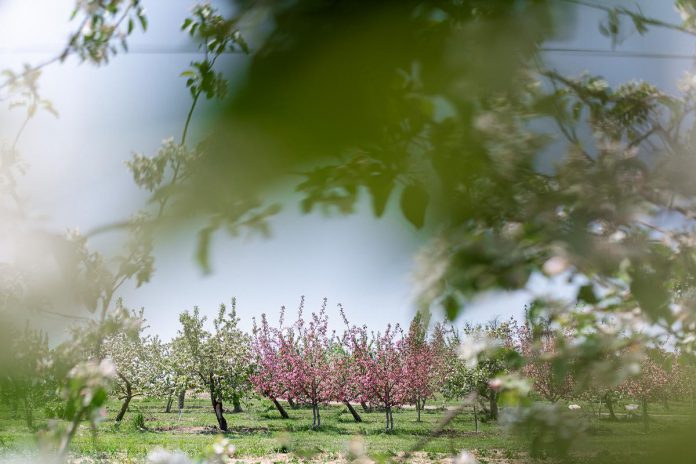
One such piece of history Galea explored in her research included the history of the “Haliburton Apple,” described in an 1890 issue of the Canadian Horticulturalist Journal as a “pretty” apple that is “very hardy and bears heavily every year,” though it is admittedly “of poor quality.”
“If you go along the side of the road to where there’s now a municipal property, but it used to be a homestead, there’s an apple tree out front,” Galea says. “It’s clear that they recognized the value of apple trees back then when they were faced with a really hard frontier and knew they had to provide for themselves.”
“It’s funny to see those ancient relics existing by the side of the road and nobody touches them, but they’re still loaded with fruit, and we want to highlight that across the community.”
Galea explains that one of ATIP’s reasons for wanting to spread this knowledge and history is to fight food insecurity in the region.
“There are not a lot of opportunities for fresh food in the area and 12.9 per cent of Haliburton County is considered as low income,” says Galea. “It’s important to highlight that we have these resources in the county. They have just been forgotten, and all we have to do is pay more attention.”
Locals and visitors can explore some of these trees as they bloom next month during the second annual Apple Blossom Tour.
The self-guided tour, which will be marked on a printed maps and distributed around the county, will take participants to roughly 40 locations bearing blooming apple trees, including view-from-afar private properties and municipal properties. New this year, restaurants and other local businesses will be on the maps and promoting their apple-inspired treats, drinks, and specially made products.
“Haliburton County is so geographically large that they’re all spread out, so every part of the community will have some access to some part of the tour,” says Galea.
Hook Line & Sinker at 126 Highland Street in Haliburton will be serving up a caramel apple martini as their cocktail of the month, while other businesses will have apple fritters, preserves, ciders, and more on their menus.
“It’s something that all age demographics can participate in, and it doesn’t have to be super involved-it’s as simple as going out for a drive,” Galea says. “There are so many businesses that are looking to be a part of the tour and, as a small community, it’s really important for organizations to support other organizations and that’s the great thing about the Apple Blossom Tour.”
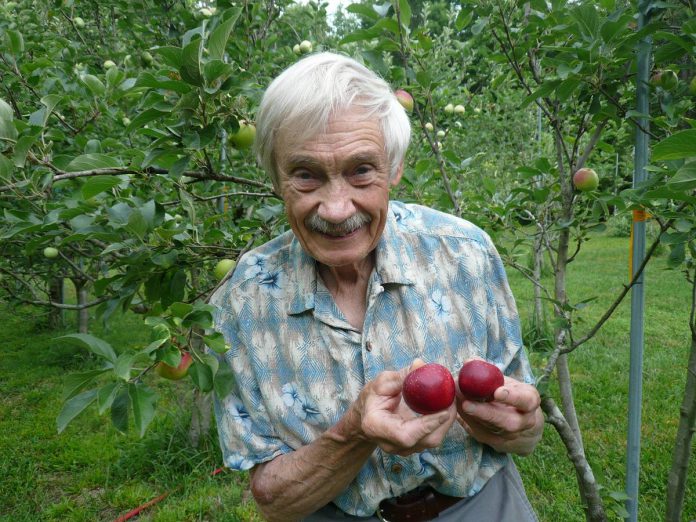
Also happening during the month of May is the inaugural All About Apple Trees Symposium, featuring two days of panels, expert speakers, networking, and strategies for revitalizing apple trees in the county.
The keynote speaker for the event is “apple hunter” and orchardist Tom Brown, who focuses on discovering “lost” heirloom apples by raising more than 700 varieties of rare and endangered apples on his North Carolina orchard.
Brown is joined by Helen Humphreys, the award-winning author of The Ghost Orchard, which dives into the history of apples in North America, and Dr. Brian Husband, a University of Guelph professor in the department of integrative biology and member of the Ontario Heritage and Feral Apple Project. His works looks at the genetics of heritage species and how they change, evolve, and interact with local environments.
The symposium will also include presentations on Galea’s own research, the history of the Haliburton Apple, the SIRCH (Supportive Initiative for Residents in the County of Haliburton) applesauce project, and much more.
“We opened this up because we’re noticing a lot of the community has an interest in permaculture, local self-sufficiency, and sustainability,” says Galea.
“There’s just a search for a knowledge that we don’t necessary have the resources to in our grasp, so we rallied a great group of individuals that are going to come and speak about apple cultivation in the area.”
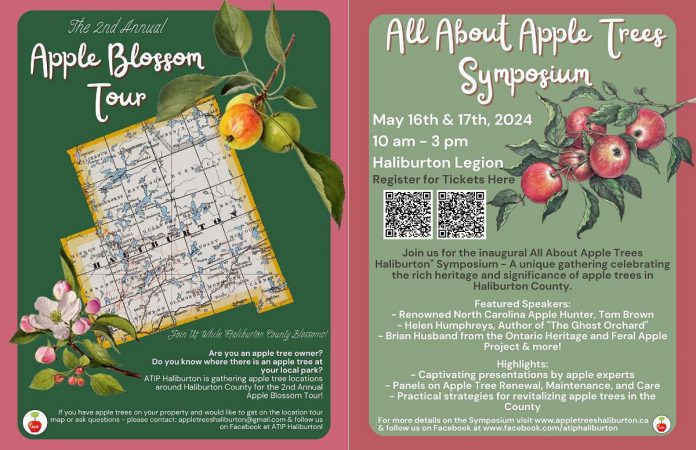
With Haliburton County relying on tourism, which there is no shortage of in the winter and summer months, the focus on the celebration of apple blossoms makes Haliburton a destination even in the springtime.
“It’s nice to fill a gap in the event calendar and have something that is really accessible for everybody and makes it great for all ages,” says Galea. “We’re hoping the Apple Blossom Tour will become a new tradition in the region where people come to Haliburton to see all the apple blossoms and give local businesses more of a rush before the summer starts.”
While it might seem the ATIP Haliburton already has a lot on its plate, it is “apple-solutely” only the start of the work to be done by the organization.
“We’re just getting ramped up, as this is our first year being a registered non-for-profit and we’re getting details ironed out so there’s going to be lots of new initiatives,” says Galea, noting community orchards as on the list of projects.
“We want to feed people and provide enjoyment and entertainment — there are really diverse goals we have at the ATIP Haliburton, but we’re working away at them.”
For more information about ATIP Haliburton and the upcoming symposium (including registration links), visit www.appletreeshaliburton.ca.






